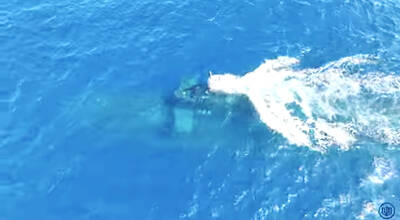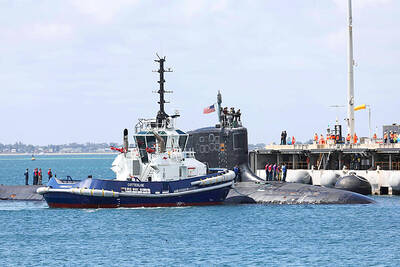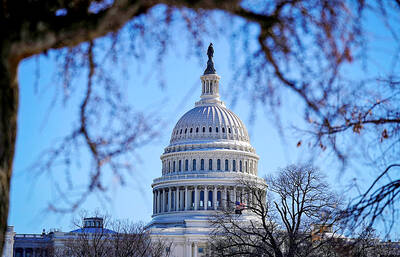A Catholic archbishop kidnapped in Iraq has been freed, the Vatican said yesterday.
Pope John Paul II was informed immediately of the release, said papal spokesman Joaquin Navarro-Valls.
"He changed his prayer to one of thanks," he said.
A ransom of US$200,000 had been demanded at first but the bishop was released without the payment of any money, the Vatican said.
The prelate kidnapped on Monday was Basile Georges Casmoussa, 66, of the Syrian Catholic Church, one of the branches of the Roman Catholic Church.
The Vatican had branded the kidnapping a "despicable terrorist act" and demanded his immediate release.
A priest in Iraq said on condition of anonymity that the archbishop was walking in front of the al-Bishara church in Mosul's eastern neighborhood of Muhandeseen when the gunmen forced him into a car and drove away.
The reason for the kidnapping was unclear but Christians -- tens of thousands of whom live in and around Mosul -- have been subjected to attacks in the past.
Navarro-Valls said the Vatican didn't view the kidnapping as an anti-Christian act but part of the general climate of violence in Iraq. He said the archbishop was well-loved in the community.
Meanwhile, eight Chinese nationals were kidnapped by militants in Iraq, the official Xinhua news agency said yesterday, citing the Chinese embassy in Baghdad.
The al-Jazeera TV channel yesterday aired footage of the alleged prisoners in Iraq, whose abductors are threatening to execute them unless Beijing "clarifies its role" in Iraq within 48 hours.
The kidnappers said that the eight "worked with US forces in Iraq," the Qatar-based station said, showing the group surrounded by two hooded gunmen.
Elsewhere, Iraqi officials said yesterday that they will seal the country's borders, extend a nighttime curfew and restrict movement inside the country to protect voters during the Jan. 30 elections, which insurgents are seeking to ruin with a campaign of violence.
Attacks continued yesterday, with a suicide car bomber detonating explosives outside the offices of a leading Shiite political party, killing himself and three other people as part of an apparent rebel campaign to frighten Shiites from voting.
Also, masked gunmen killed a Shiite Muslim candidate in the Iraqi capital.
Sunni Muslim militants, who make up the bulk of Iraq's insurgency, are increasingly honing in on Shiites in their campaign to ruin the Jan. 30 election that is widely expected to propel their religious rivals to a position of dominance.
Yesterday morning's car bombing gouged a crater in the pavement, left several vehicles in flames and spread shredded debris and flesh on the street outside the offices of the Supreme Council for the Islamic Revolution in Iraq (SCIRI), a main contender in the election.
The party has close ties to Iran and is strongly opposed by Sunni Muslim militants.
The assailant told guards at a checkpoint leading to the party's office that he was part of SCIRI's security staff, but detonated his bomb-laden car at the guard post when he was not allowed to enter.
The US military reported that the bomber and three others were dead and that four people were injured.
Iraq's Independent Electoral Commission announced that the country's international borders would be closed between Jan. 29 and Jan. 31, except for Muslim pilgrims who are returning from the hajj.
Iraqis will also be barred from traveling between provinces and a nighttime curfew will be imposed during the same period, a statement said.
A third US trooper also died in fighting in Iraq's troubled Anbar Province, west of Baghdad, the military said yesterday.
Two other soldiers assigned to the 1st Marine Expeditionary Force were also killed in action there on Monday.

CSBC Corp, Taiwan (台灣國際造船) yesterday released the first video documenting the submerged sea trials of Taiwan’s indigenous defense submarine prototype, the Hai Kun (海鯤), or Narwhal, showing underwater navigation and the launch of countermeasures. The footage shows the vessel’s first dive, steering and control system tests, and the raising and lowering of the periscope and antenna masts. It offered a rare look at the progress in the submarine’s sea acceptance tests. The Hai Kun carried out its first shallow-water diving trial late last month and has since completed four submerged tests, CSBC said. The newly released video compiles images recorded from Jan. 29 to

DETERRENCE EFFORTS: Washington and partners hope demonstrations of force would convince Beijing that military action against Taiwan would carry high costs The US is considering using HMAS Stirling in Western Australia as a forward base to strengthen its naval posture in a potential conflict with China, particularly over Taiwan, the Wall Street Journal reported on Saturday. As part of its Indo-Pacific strategy, Washington plans to deploy up to four nuclear-powered submarines at Stirling starting in 2027, providing a base near potential hot spots such as Taiwan and the South China Sea. The move also aims to enhance military integration with Pacific allies under the Australia-UK-US trilateral security partnership, the report said. Currently, US submarines operate from Guam, but the island could

RESTRAINTS: Should China’s actions pose any threat to Taiwan’s security, economic or social systems, China would be excluded from major financial institutions, the bill says The US House of Representatives on Monday passed the PROTECT Taiwan Act, which states that Washington would exclude China from participating in major global financial organizations if its actions directly threaten Taiwan’s security. The bill, proposed by Republican Representative Frank Lucas, passed with 395 votes in favor and two against. It stipulates that if China’s actions pose any threat to Taiwan’s security, economic or social systems, the US would, “to the maximum extent practicable,” exclude Beijing from international financial institutions, including the G20, the Bank for International Settlements and the Financial Stability Board. The bill makes it clear that China must be prepared

Taiwanese trade negotiators told Washington that Taipei would not relocate 40 percent of its semiconductor production to the US, and that its most advanced technologies would remain in the nation, Vice Premier Cheng Li-chiun (鄭麗君) said on Sunday. “I told the US side very clearly — that’s impossible,” Cheng, who led the negotiation team, said in an interview that aired on Sunday night on Chinese Television System. Cheng was referring to remarks last month by US Secretary of Commerce Howard Lutnick, in which he said his goal was to bring 40 percent of Taiwan’s chip supply chain to the US Taiwan’s almost